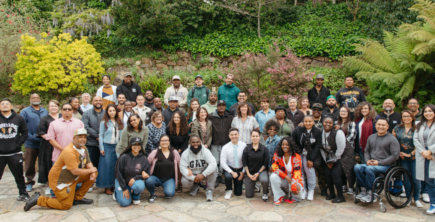
Corporate Partners
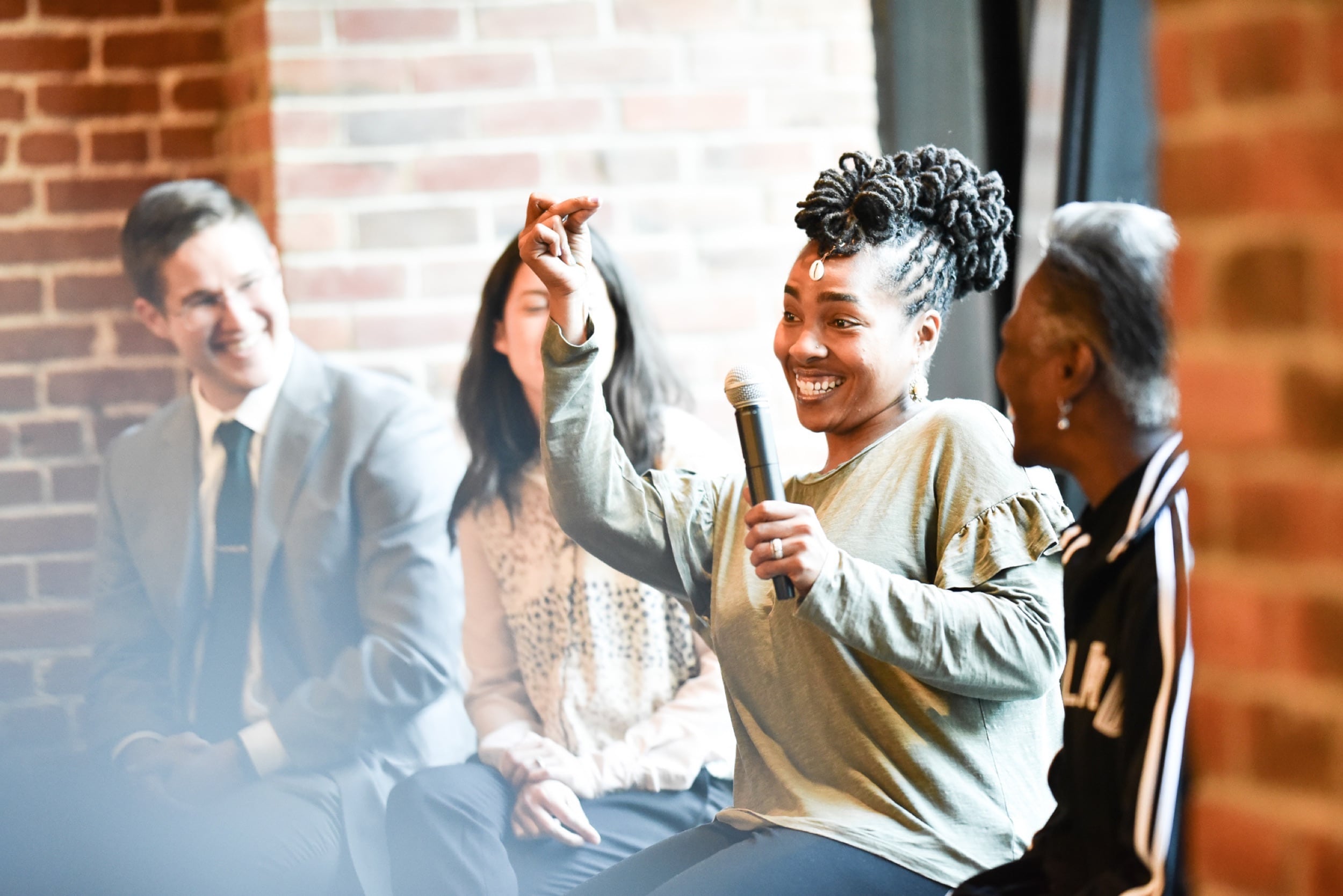
Voter turnout in the 2022 midterm election far exceeded expectations. That’s due in no small part to the work of organizations like Public Rights Project (PRP), a fiscally sponsored project of Tides Center. PRP’s fellowship program supported efforts to increase ballot access in Michigan, and their efforts paid off. The 2022 midterm election turnout in Michigan made history, with 4.45 million voters.
Like the many voters who cited abortion as a pressing concern, PRP founder Jill Habig says that the erosion of core constitutional rights like abortion was a key motivation that drove her to create the Public Rights Project in 2017. The fight has taken on new urgency since Dobbs v. Jackson Women’s Health Organization, the 2022 U.S. Supreme Court decision that effectively overturned the constitutional right to abortion.
“Since the Dobbs decision, we have really moved into rapid response mode. We are working with local and state government officials to help them use all of the legal tools at their disposal to shore up abortion rates in states where that is possible, and to reduce and challenge criminalization of abortion where bans have been passed,” says Habig. Michigan was one of approximately 20 states that had dormant laws or trigger laws — laws that were on the books but unenforceable while abortion remained a constitutional right. Habig says that in the months before the decision came down, their partners in Michigan called saying: “We need help. They’re going to overturn Roe. Michigan has a criminal ban.”
PRP has been working on reproductive justice issues since its founding, helping to organize state and local governments to use all of the legal tools at their disposal in the power and service of reproductive justice. Habig cites other important issues including the right to vote and the surge in wealth inequality as factors that spurred her to launch PRP in Oakland, California, with Tides serving as fiscal sponsor: “We think all of those forces are undermining our democracy in really fundamental ways, and all of those fights are now being pushed down to the state and local level. Our state and local government partners have a really important role to play in shaping the future of our democracy.”
A veteran of the district attorney’s office in San Francisco, Habig saw a gap between what the law mandated and what was actually happening on the ground, particularly in underserved and BIPOC communities. PRP works with state, local, and tribal governments to ensure that legal rights that exist on paper are enforced.
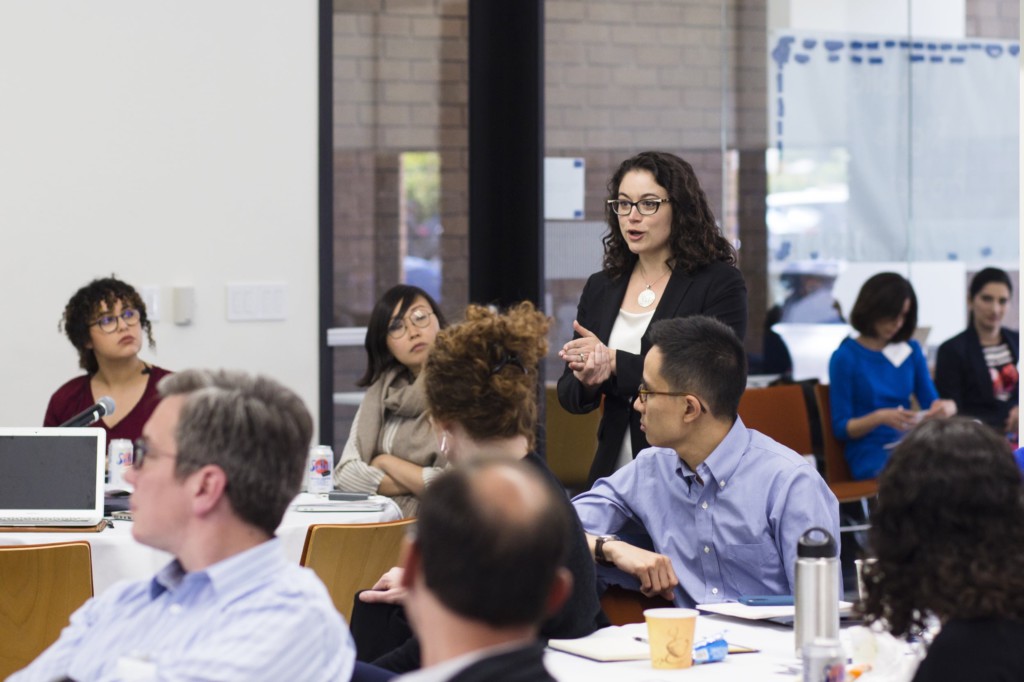
PRP Founder Jill Habig speaks to a gathering of mid-career leaders in state and local government who are joining PRP’s Affirmative Leaders Fellowship. (Photo from PRP)
PRP takes most of its cues from the current needs of communities, hence their quick action following the fall of Roe, but the organization also focuses on the general health of the democracy. They work across the country to ensure that ground gained through the democratic process reaches the entire community using three core strategies: working with governmental offices to pursue high-impact cases; developing attorneys who can lead such efforts; and supporting community organizations. Their outreach includes liaising with these grassroots organizations to understand the real-life issues affecting people and building bridges between these organizations and the governments that can enforce the rights of these frontline communities.
“Even before the fall of Roe, there were a lot of challenges with abortion access across the country, even though it was legal on paper,” notes Habig. Because of the work they had done with state and local government partners to enforce that right, PRP was able to move quickly when the Dobbs decision was released.
PRP had already signed on to represent a group of pro-choice prosecutors in litigation in the Michigan Supreme Court, to try to overturn the very old pre-Roe criminal abortion ban that suddenly became enforceable this summer. “The [Michigan] law only allowed for abortion to save the life of the mother,” Habig said. “Doctors are forced to make harrowing decisions about what likelihood of death is sufficient for them to be able to provide abortion care without fear. For people who have pregnancy complications, or any other solution that makes pregnancy dangerous, that is really stark, particularly for women of color and Black women who have much higher rates of maternal mortality.”
PRP works strategically, taking various routes to find the issues that are having a profound effect on people’s lives and looking for issues that call out for civil rights enforcement. Recently the organization has also been pursuing a case in Florida over HB1, a nominally “Combating Public Disorder” law that PRP sees not only as a suppression of First Amendment rights for the purpose of stymieing protests against police brutality, but as a fundamental undermining of civic process. While the “anti-riot” aspect of the bill has garnered the most attention, PRP is challenging a second piece of the law that Habig says is just as dangerous. It gives the state’s governor and his cabinet line-item veto to override local level budget decisions that affect law enforcement funding.
She gives the example of a community that might successfully petition a local government to pilot a program shifting resources to mental health providers rather than police officers as first respondents to mental health calls, only to have it wiped out with a swipe of the governor’s pen. Habig sees it as a blatant attempt to skirt democracy with the governor’s office essentially saying: “If you actually successfully navigate the political process and get your government to agree with you and make change, we’re going to override that.”
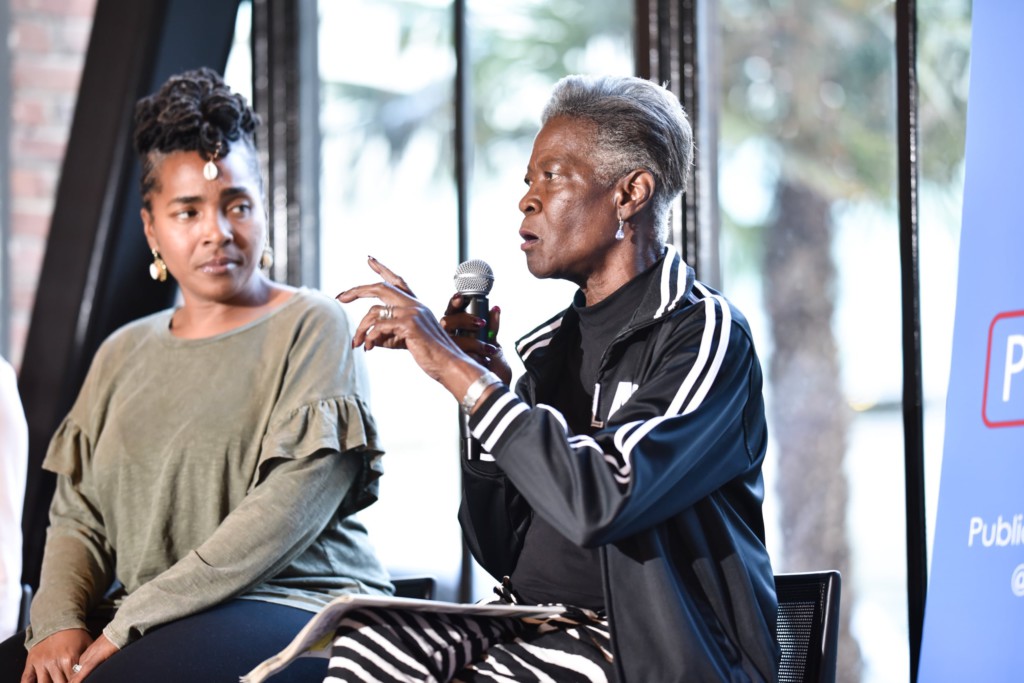
West Oakland residents discuss how they organized to spur a lawsuit by the Oakland City Attorney’s Office to protect their rights. (Photo from PRP)
This has a debilitating effect on democracy: When people don’t see results after an effort, they don’t feel motivated to continue civic participation. In an effort to end that cycle of disenchantment and subsequent disengagement, Habig says that PRP hones in on “what happens after we mobilize to win and elect a great new candidate or public official, or we mobilize to win a great new ballot measure or a new progressive law that protects tenants, protects workers, protects civil rights. How do we make sure that those laws actually translate to changes in people’s lives? That’s a really critical part of a healthy democracy.”
PRP’s efforts in Florida have helped win an injunction against HB1, which the governor of Florida is attempting to get overturned. The governor’s resounding re-election victory on November 8, coupled with his party’s gain of supermajorities in both the Florida Senate and House, means that democratic debate can be easily stifled in Florida, rendering PRP’s work there all the more urgent.
The organization is ready for the challenge: Its ability to quickly respond to shifting political landscapes is due to its sustained work over the past five years, Habig says. In addition to the strong ties that will serve them as struggles intensify in Florida, she notes that the relationships they built over several years of working with government partners made PRP a point of contact this summer when reproductive justice advocates went into crisis mode across the country.
“We would not have been in a position to jump in Michigan and protect people from prosecution if we hadn’t built relationships in the state over the last three years we’ve been working with our partners,” says Habig. She credits the funding that enables them to create ties not solely around crises, but multiyear sustained partnerships with state offices and grassroots organizations that share a long-term approach to supporting true democracy. “That’s a really important thing for funders to think about at this moment,” Habig says. “How do we, yes, react to the crises in front of us, but also help organizations lay the groundwork for the things we can’t predict?”

Corporate Partners

Philanthropy
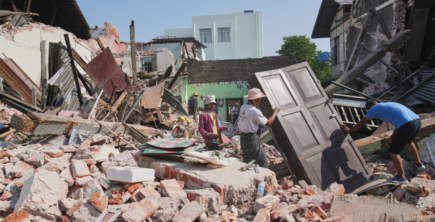
Healthy Individuals & Communities

Read the stories and hear the voices of social change leaders fighting for justice.